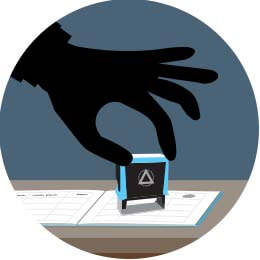Notaries are the first line of defense against forgery, identity theft, mortgage fraud and other document fraud crimes. This means that dishonest Notaries who violate their official duties can wreak havoc in real estate and other transactions of value when they commit illegal acts. If you witness a fellow Notary intentionally violating their duties, you should report them to the Notary commissioning and regulating official of your state and law enforcement. This is in keeping with Standard X-B-1 of The Notary Public Code of Professional Responsibility of 2020, which says, “The Notary shall report to the commissioning or other regulating authority violations of the statutes, regulations, and official guidelines governing the conduct of Notaries.”

Notary crimes cause serious harm
In the mid-2000s, an infamous Los Angeles con artist stole home titles by filing fraudulent deeds. To everybody who met him, this con artist seemed honest and genuine. Using his persuasive skills, he told a local Notary that he helped homeowners in foreclosure who did not have time to appear in person for notarizations. He asked the Notary to sign and stamp one hundred blank deeds, and the Notary did so. The con artist later filled in the blanks to make it look like his companies owned the properties, and then he sold them, took out mortgages against them, or put tenants in them and fraudulently collected the rent.
Another con artist, who belonged to six different churches, victimized church-goers under the guise of being a mortgage broker. At church, where he hunted for his victims, he persuaded his fellow parishioners to fill out mortgage loan applications to see if he could “find them a better interest rate.” Using their personal identifying information, he obtained mortgages in their names and bought 25 houses, which he then filled with tenants and collected the rent. How did he get his victims’ notarized signatures on the mortgage documents? His girlfriend was a Notary who let him borrow her stamp and journal.

Where do you report a Notary crime?
Over the past six months, readers from various states have messaged The National Notary Bulletin’s blog comments section asking how to report alleged Notary crimes they witnessed. One reader claimed a Notary at a local car dealership was signing and notarizing the names of deceased people on documents. Another from New York claimed that a local Notary was notarizing fraudulent signatures with an expired commission. A third alleged a Notary had falsely notarized documents to enable someone else to gain ownership of her deceased father's car.
If you observe that another Notary has intentionally committed a criminal act, you should report the conduct to the agency that regulates Notaries in your state. Some states like Florida and California even provide forms online to make your complaint. However, while state Notary agencies may be able to administer administrative penalties for Notary misconduct, this does not guarantee that a bad Notary will be referred to law enforcement for criminal prosecution.
When reporting a suspected Notary crime in Florida, the Florida Notary Department says a complaint should include any facts related to the alleged misconduct, including the portion of Chapter 117 of the Florida Statutes, which is relevant, along with copies of any documents alleged to be improperly notarized.
According to California Notary Public Section Manager Lee Garvey, the best way to report fraud committed by California Notaries is to complete the complaint form and include certified copies of any relevant documentation to the following address:
California Secretary of State
Notary Public Section
P.O. Box 942877
Sacramento, California 94277-0001.
While the state Notary office can investigate complaints against California Notaries, it does not have the legal authority to order money to be refunded or damages to be awarded. Garvey said any questions about recovering lost funds or voiding fraudulently notarized documents would need to be answered by an attorney.

Other agencies that investigate Notary crimes
Lee Garvey brings up an important point. Commissioning officials generally do not have the authority to pursue criminal complaints involving Notary misconduct. After notifying your Notary commissioning and regulating official, you should also file a report with local authorities such as the police, the district attorney, or a local government fraud investigative unit. These authorities then can review the report and determine whether to file a criminal complaint against the perpetrator.
“Unfortunately, the most common illegal Notary acts reported to our office are those that we do not have authority to investigate, mostly involving allegations of fraudulent signatures. We advise the complainants to contact local law enforcement, a local prosecuting attorney, and their own private attorney for assistance,” said Arkansas Notary Administrator David Easley.
Even if your state Notary commissioning or regulating official can't directly investigate a complaint, Easley said it’s still a good idea to contact them anyway and report the suspected crime. “By submitting the Notary complaint, they are putting the Notary Public and the Arkansas Secretary of State on official notice that suspected illegal activity has occurred. This is an important first step in seeking any sort of criminal and/or civil recourse,” Easley said.
Sam Taylor, Texas Assistant Secretary of State for Communications, suggested that if the Notary crime being reported involves identity theft, phone or email scams, elder abuse, or healthcare fraud, the suspected illegal activity should be reported to a state consumer protection agency, such as the Attorney General’s Consumer Protection Division in Texas.

What information should you provide?
Supporting information is very important when reporting a suspected Notary crime to Notary commissioning and regulating officials and local law enforcement. You should include as much information as possible about the Notary involved, as many details about the alleged crime as possible, along with copies of supporting documents or evidence you have.
“It is important to include the name of the Notary as it appears on the Notary’s commission, the commission number, the business or mailing address for the Notary, and all relevant details regarding the notarial misconduct being alleged,” Garvey said.
In Texas, the Notary complaint must include documentation that supports the allegations, including a copy of the notarized document in question, and the completed complaint form must be notarized with a sworn statement under penalty of perjury that the information submitted in the complaint is true and correct, Taylor said.
But don’t be afraid to report a suspected crime even if you don't have all the details. You never know when it might add the missing puzzle piece to an investigation that is already underway. If you observe a colleague intentionally violating their Notary duties, make a report to the government agency that regulates your profession and to law enforcement as soon as possible. The damage that an unscrupulous Notary can cause is too great to let it slide.
David Fleck is a former L.A. County Deputy District Attorney with more than two decades of experience in fraud cases. Consuelo Israelson is a freelance writer who frequently covers Notary related issues.
Related Articles:
5 scammers Notaries need to watch out for
Duping Notaries: The tricks fraudsters use